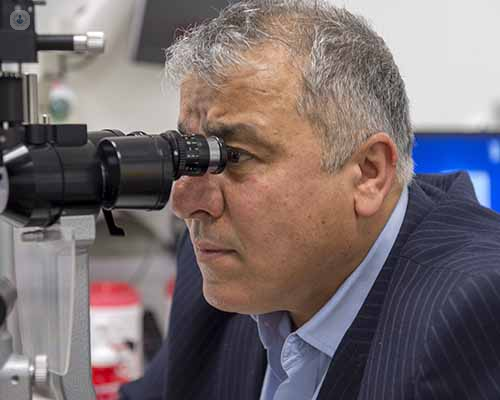Possible complications of cataract surgery
Written by:Like any surgical procedure, there are certain risks associated with cataract surgery, however, these are very rare. Cataract surgery has a very high success rate, with most patients noticing improvements in their vision following surgery. Complications that can arise either during or following cataract surgery can often be dealt with there and then, but for those that occur during recovery, it is important to note what is normal and what is not. If you notice any of the following symptoms after surgery, see your doctor as soon as possible.

Infection:
If you feel any pain or visual deterioration in the first 48 to 72 hours after surgery it could be an indication of infection inside the eye. Infections inside the eye after eye surgery can be very severe and can lead to total loss of vision or even loss of the whole eye. Infections are very rare after cataract surgery and the process can be reversed if treated quickly. Mr Dhawahir-Scala is a leading expert worldwide in treating this type of condition and many clinicians around the UK send him patients with this type of condition for his expert opinion. Thankfully it is not a common condition and Mr Dhawahir-Scala has excellent results in treating this condition with a success rate of 90% of cases achieving excellent levels of vision after treatment. .
Retinal detachment:
After cataract surgery, there is a small increase in the chances of retinal detachment. This is when the retina pulls away from the back of the eye. If not treated, retinal detachment can result in a loss of vision, so if you notice any flashes of light, floating spots in your vision or a shadow over your vision then visit your doctor immediately. Mr Dhawahir-Scala is an expert in treating retinal detachments.
Dislocated intraocular lens (IOL):
The IOL is the artificial lens used during cataract surgery to replace the clouded lens. If this new lens moves after surgery, it can cause loss of vision. If you notice any changes in your vision, see your eye doctor to ensure the IOL positioning is assessed and managed if needed. Mr Dhawahir-Scala is a leading expert in this field and uses several techniques to correct this with excellent results.
Secondary cataract or posterior capsular opacification:
P osterior capsule opacification (PCO) is clouding which happens behind the newly implanted lens. This tends to happen a few months to years after cataract surgery. This is not uncommon and is not a major complication. Posterior capsular opacification is an easy condition to manage. If clouding occurs. The condition is easily treated with laser.
Sensitivity to light:
This is expected following cataract surgery, however, if it persists it may be an indication of inflammation in the eye which can be treated with certain eye drops. Sunglasses can also help in the interim whilst your eyes heal and adjust.
If you are interested in finding out more about cataract surgery or would like to have a second opinion on a complex cataract please make an appointment with Mr Dhawahir-Scala.


